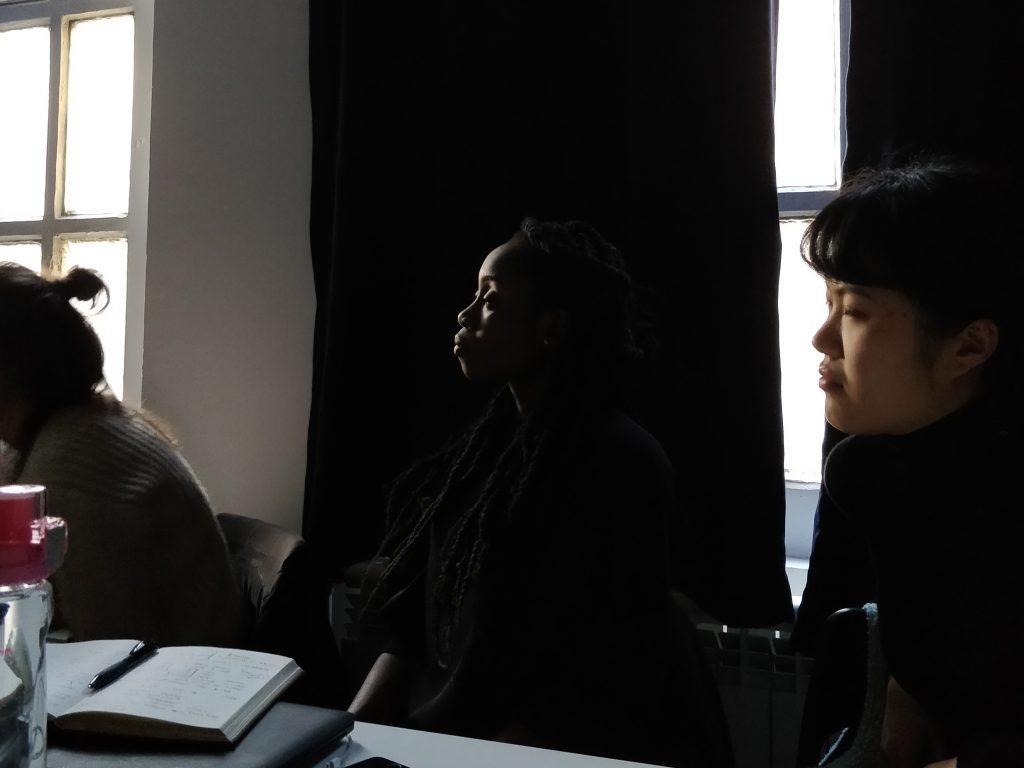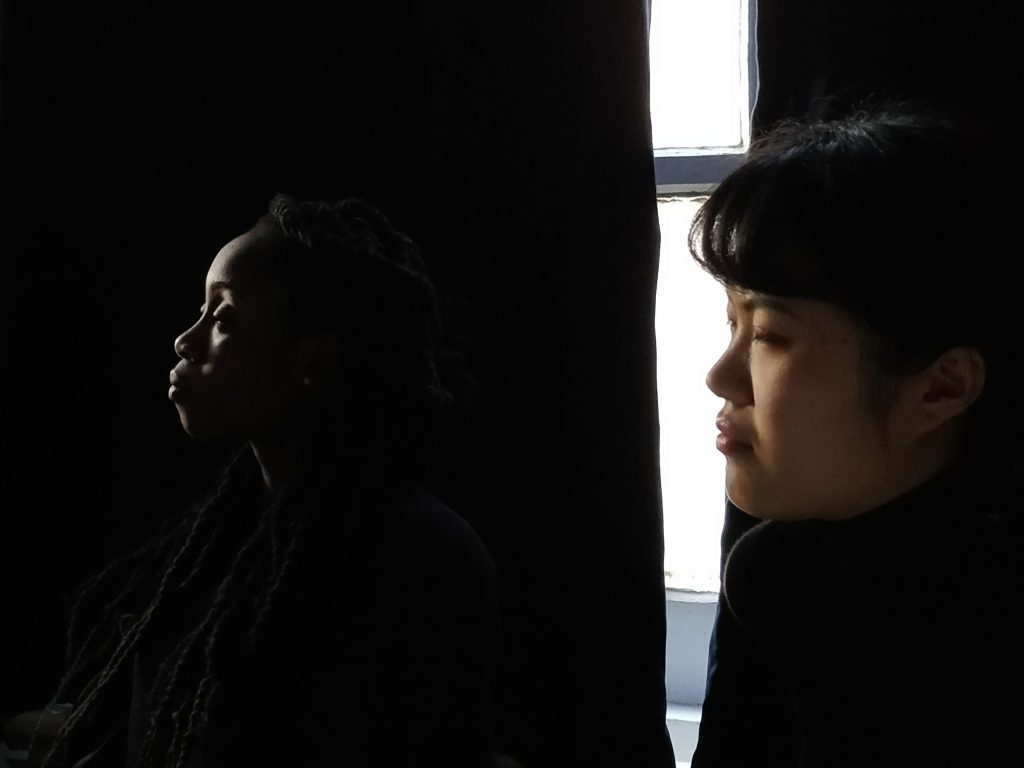
Our Master in City & Technology class is as diverse as can be. We are different ages (23-32), we have different professional backgrounds (agriculture, interior design, fresh graduates to licensed professionals), a dozen languages between us (Mandarin, Arabic, Yoruba, and, you know… English), three-and-a-half religions…… Designing and debating with my new friends is exciting, because no two opinions are the same and no one is afraid to speak. Every class is an occasion to encounter another worldview, which means it is also an occasion to admit that my own was misplaced.
North Americans are obsessed with race. Rightly so, since its history is marred by an injustice about which we to this day are in denial. Every American’s adulthood involves reckoning with it at some point, and so have I too cultivated a position on racism which I tuck behind my cheek like chewing gum for whenever I should need it. It has sat there for years now, still smacking of tangy cynicism, minty socioeconomic un-self-awareness, a fruity impulse to label offenders and victims, and those gritty blue flakes of American exceptionalism which I don’t like but can’t avoid. Without noticing I came to believe that this was it: my relationship to racism had matured.
It was the first week of class, and every seminar was spent introducing ourselves and talking big concepts and aspirations with the professors. In our first Fab City class we got on the topic of the emergence of global networks. I asked whether anyone worried that these new technologies could further increase the gap between rich and poor, instead of being the great democratizing paradigm shift that many claim it to be. Global networks work the best when every human being is connected to them, so shouldn’t the focus be on bringing connectivity to the ones least likely to get it? How do we avoid leaving people behind?
“In principle, yes,” said Tomas, our professor. “But in reality these transitions are happening constantly. The work of the more privileged should always be to distribute wealth and opportunity to the less privileged, but once you finish connecting those people, the rest of the world will have moved on. This is is happening constantly. People are getting thrown from one radical shift to another.
“Like in Africa,” he continued, “most of the continent didn’t even go through a proper Second Industrial Revolution. And now in the past couple of decades they have jumped from agriculture to the internet. It is super radical.”
Maggie reacted immediately. “Yeah, that’s crazy how you’re all on the grid now…” she was looking at Venessa. We were all looking at Venessa. I saw her gaze sharpen. She smiled gently and said, with mild surprise, “Do I need to say something?”
Everyone chuckled and looked down, including Maggie whom I heard mutter something that from its intonation sounded like an apology. With my racism cap on, I knew exactly what she, a white American from California, was thinking.
I left class that day feeling uncomfortable, sad for both Venessa and Maggie. Nine times out of ten this would have been an isolated moment, eventually forgotten, not worthy of sealing in a Ziploc for future trials. I could have moved on with my life infinitesimally more at ease for not having said something like that myself. But learning to identify these moments sits lowest on the ladder of praiseworthy behavior. I had come to Barcelona with the intention of learning about the world, which I realized should include both big data storytelling and making new friends.
Then a few weeks later, we were in another class, in which we were building a catalog of the streets of our home cities. One page of this catalog was meant to show common parameters like street width, street use, traffic flow and speed. I was in charge of designing the graphics of these parameters. To get an idea of the range of speeds I had to account for, I asked Venessa what the highest number is on odometers in Nigeria.
Suddenly everyone around me spoke up in cacophonous tones saying, “Come on, Ivan, it depends on the car maker, not the country.”
After the five seconds of noise died down, I could only mutter, “Sorry, you’re right,” while thinking to myself, “Crap. Did I just do that thing that I smugly believed I would never do?” I pictured Maggie’s eyes on me, wondering the same, and infinitesimally relieved that it was me and not her. Were we, the two race-obsessed Americans in the class, the only ones who even saw the moment that way? Was the cacophonous rebuttal from the others simply in response to my ignorance of how cars work? I wasn’t sure.
The following weekend Venessa and I took a walk around the neighborhood for an assignment. We talked about many things, including religion and spirituality, where she opened up to me about her Christian faith, and I to her about my serious ambivalence on believing in God. We sat down at a cantina for a sandwich. She was confused by my ordering just a salad. Then I got around to asking her about Maggie’s comment two weeks before.
“Do you remember that? I remember thinking, ‘Oooooh,'” I said, making a face like the ones I make when I watch drunk people trip on the street. I was baiting her for a bit of gossip.
But to my surprise, she took a breath and said, “I do remember. I just felt bad, because I’m only one person. I would never want to speak for someone I didn’t know. I wanted to have more of an opinion, but I just didn’t have anything to say.”
It wasn’t a defensive response, it was a humble one. She was speaking not just as a black person, she spoke as a Christian, as a Nigerian, as a woman…. There was nuance behind the simplicity of her thoughts, an obvious humanity which I had tuned out over the years, like chewing gum behind my cheek. In the US, despite our hymns of freedom, we are in fact quite prude. We are so sensitive to certain topics (like race or sex) that we avoid touching the subject altogether. As a result, we forget that behind every person there is a person, complete with race, sex, faith, family, and everything else.
The semester went by and we all went home for the holidays. When we came back in January, we spent much of our dwindling free time sharing photos of one another’s vacations. Venessa showed us photos from her sister’s wedding. Irene and I stared at the screen.
“Eh, which one is you?” Irene asked.
“That one,” Venessa said calmly, pointing herself out.
“Eh? But your hair is so different!”
“I changed it. It’s OK, Irene. One day you’re going to learn to identify black people by something other than their hair.”
She said this without a hint of venom, with such gentleness that the only reaction our bodies found appropriate was hanging our heads and laughing, with each “ha” like a just kick in the knees.
A few minutes later, when we were done with our meeting, Venessa looked at me and asked jokingly, “Am I dismissed?”
“I… You are not in my custody,” I answered. I decided not to play along. She was allowed to tease me. Venessa put her coat on and as she walked out of the classroom she spread her arms, started skipping, and said, “It feels so good to be free!” I felt infinitesimally relieved for having decided to not play along, because that would mean saying “I don’t own you” aloud. Which, if the way it made me feel just thinking about it was any indication….
Venessa was gone and I sat there reveling in the fact that I had just been teased for my race. For a peacekeeper like me, it’s difficult as a default to part ways with an inkling of bad spirits. But I reminded myself that Venessa harbors no ill intentions, only grace. She was just making us aware that we were spouting harmless ignorance. Any fledgling friendship requires people to make themselves vulnerable to one another. So long as she knows that I respect her, I will solemnly accept being made fun of for my whiteness. Them’s the breaks.
